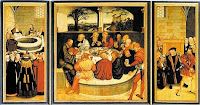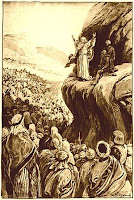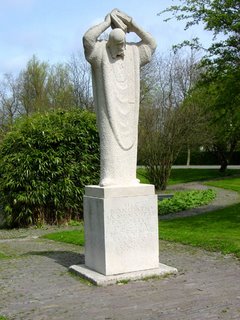Q: I reviewed your archives — and am surprised not to find a response to a question about women reading the lessons in the Divine Service. Tell me what you think. I am a woman with a chance to be involved in a new church start — already they’ve begun that practice and before they get too entrenched I want to give some good reference to my position against it. Perhaps you think otherwise, and then I better shut my mouth and listen. Thanks for your help.
A: If you thoroughly scoured my older writings, I’m sure that you found statements against women occupying the pastoral office, including
Family Disagrees Over Women Pastors and
Women Pastors: Yes or No. These probably led you to think that I would agree with you in the matter of women lectors. If so, you thought correctly. I, too, oppose women reading Scriptures or otherwise leading parts of Christian worship services.
My opposition comes particularly from of the Scriptures that place spiritual leadership in the hands of men — particularly to those men ordained into the pastoral ministry. How could
1 Corinthians 14:26-40 be any more straightforward? There, Paul clearly told the Corinthians (and continues to tell other believers) how an orderly, God-pleasing worship service should be conducted.

The apostle plainly stated that he was not inventing a new teaching just for Corinth. Instead, Paul said that it was true “in
all the churches of the saints (
v. 33,
emphasis added)” that “the women should keep silence in the churches. (
v. 34)” That is, they were (and are) not teach, preach, or otherwise address the saints who assembled in worship. That this was not Paul’s invention but God’s command is clear from his rather sarcastic questions in
verse 36: “Was it from you that the word of God came? Or are you the only ones it has reached?”
This isn’t an issue of superiority or domination. Rather, it includes the fact that God created men and women differently and from the beginning called them to different vocations. As former
Lutheran Church — Missouri Synod President A. L. Barry wrote, “We believe that God has gifted men and women with different responsibilities and duties.... So also in the church, God has gifted men and women with different, though complementary, opportunities and responsibilities for service. (from
What about ... The Ordination of Women to the Pastoral Office)”

The call into the preaching office isn’t merely a matter of ability. Even more so, what matters is following the Scriptures. The arguments from the order of Creation (man was made first), including male headship, the example set by Christ in calling only men to be His apostles, Jesus’ incarnation as a man, Paul’s admonitions against women speaking to the assembly and leading worship, and the like all convince me that God desires a male-only clergy.
Along with the male-female distinctions, we need to examine what Scripture says concerning the different roles of the clergy and the
laity. I prefer not even to use
men to read the Scriptures in public worship unless they are especially trained and also consecrated or installed into such positions. Some church bodies do this through a formal deaconate. Some congregations similarly establish elders or deacons as associate or auxiliary pastors whom they call to assist their pastors in fulfilling some of the duties of the pastoral office.

The first Lutherans acknowledged that God’s Word established a formal order. Our earliest corporate statement of belief, the
Augsburg Confession, provides the evidence. Immediately after confessing that the heart of the Christian Church is justification by grace through faith in Christ (see
Article IV) the Confession states plainly, “That we may obtain this faith, the Ministry of Teaching the Gospel and administering the Sacraments was instituted. (
Article V)”
A bit later,
Article XIV establishes the formal process and minimum requirement for such ministers of the Gospel: “Of Ecclesiastical Order [we] teach that no one should publicly teach in the Church or administer the Sacraments unless he be regularly called.” In Latin, these last three words are rendered
nisi rite vocatus, “without being called according to rite.” While we may speak of them separately, call, ordination, and installation all belong to our understanding and practice of
rite vocatus. Therefore, among Lutherans, no one should presume to preach, teach, consecrate the Supper, baptize (except in an emergency), or proclaim formal absolution on behalf of Christ in our churches unless he is formally acknowledged by the Lutheran Church as one of its pastors.

In summary, while God calls all manner of men and women into Christ’s Church, only a few of the men are especially called into the pastoral office. In this office, Christ established and maintains the public ministry of Word and Sacrament. If you believe from the Scriptures that pastors are charged with the public proclamation of the Word and that only men should be pastors, you then run into difficulty each time a woman comes forth to read the Bible in worship. And if you are convinced from God’s Word that the reading of Scripture as well as its preaching is part of the public proclamation of this Word, you may well begin wondering if even non-ordained men should be doing so in worship services.
True, no verse flatly says, “Women shall not read the Bible to the assembled worshipers.” Nor does any Scripture say, “No man who isn’t called and ordained into a ministerial office should read the Bible to the assembly.” However, no verse clearly requires or authorizes either practice. Instead, as we examine commands and prohibitions in similar areas, we see little evidence to recommend and much to reject the practice of any woman and all lay men acting as lectors.

In my mind, a practice based upon this understanding harmonizes completely with
Ephesians 4:11-12, where Paul wrote, “[Christ] gave the apostles, the prophets, the evangelists, the shepherds and teachers ... for building up the body of Christ.” Let those whose calling is the proclamation of the Gospel proclaim and let those whom God calls to hear His Word and respond in faith hear and respond according to their own vocations.
In his 1539 book
On the Councils and the Church, Martin Luther likewise insisted that the public rites, particularly the Means of Grace, should be enacted and administered only by those called into the public ministry: “[T]he church is recognized externally by the fact that it consecrates or calls ministers, or has offices that it is to administer. There must be bishops, pastors, or preachers, who publicly and privately give, administer, and use [the preaching of the Holy Gospel, Holy Baptism, Holy Absolution, and Holy Communion] in behalf of and in the name of the church, or rather by reason of their institution by Christ.... His gifts were that some should be apostles, some prophets, some evangelists, some teachers and governors, etc. The people as a whole cannot do these things, but must entrust or have them entrusted to one person. (LW 41:154)”

Then, in keeping with what we’ve already noted, Luther went on to detail those excluded from the pastoral ministry and administration of the Office of the Keys: “[T]he Holy Spirit has excepted women, children, and incompetent people from this function, but chooses (except in emergencies) only competent males to fill this office, as one reads here and there in the epistles of St. Paul that a bishop must be pious, able to teach, and the husband of one wife [e.g.;
1 Timothy 3:2 and
Titus 1:6] — and in
1 Corinthians 14[:34] he says, ‘The women should keep silence in the churches.’
“In summary, it must be a competent and chosen man ... other persons are not qualified for this office, even though they are able to hear God’s word, to receive baptism, the sacrament, absolution, and are also true, holy Christians.... Even nature and God’s creation makes this distinction, implying that women (much less children or fools) cannot and shall not occupy positions of sovereignty, as experience also suggests and as Moses says in
Genesis 3[:16], ‘You shall be subject to man.’ The gospel, however, does not abrogate this natural law, but confirms it as the ordinance and creation of God. (LW 41:154)”
Martin Luther quoted from
Luther’s Works, Vol. 41: Church and Ministry III, © 1966 by Fortress Press.
Scripture quoted from
The Holy Bible, English Standard Version™, © 2001 by
Crossway Bibles.
Send email to
Ask the Pastor.
Walter Snyder is a Lutheran pastor, newspaper columnist, conference speaker, blogger, author of
What Do Lutherans Believe, and writer of numerous published devotions, prayers, and sermons.
Technorati Tags:
women |
clergy |
laity |
pastors |
pastors |
ministers |
preachers |
elders |
deacons |
pastoral ministry |
pastorate |
laymen |
laity |
lectors |
readers |
lay readers |
Means of Grace |
Lutheran |
divine call |
call |
installation |
orders |
ordination |
good orders |
decency |
preach |
preaching |
teaching |
teach |
Lutheran Confessions |
Augsburg Confession |
Christ |
Jesus |
Jesus Christ |
Lutheranism |
Confessional Lutheran |
Lutheran |
Christian |
Christianity |
theology |
systematic theology |
systematics |
dogma |
dogmatics |
dogma |
doctrine |
Saint Paul |
St. Paul |
exegetical theology |
exegesis |
1 Corinthians 14 |
Luther |
Martin Luther |
Pastor Snyder |
Pastor Walter Snyder |
Walter Snyder |
Ask the PastorBased on newspaper column #542:2
 Sermon Text: “Brother will deliver brother over to death, and the father his child, and children will rise against parents and have them put to death, and you will be hated by all for my name’s sake. But the one who endures to the end will be saved.” Matthew 10:21-23
Sermon Text: “Brother will deliver brother over to death, and the father his child, and children will rise against parents and have them put to death, and you will be hated by all for my name’s sake. But the one who endures to the end will be saved.” Matthew 10:21-23















